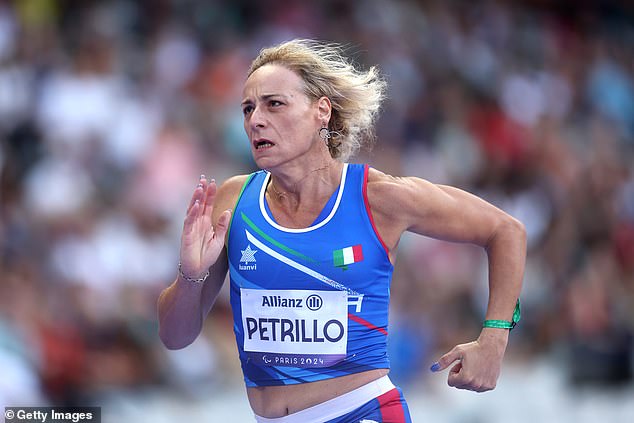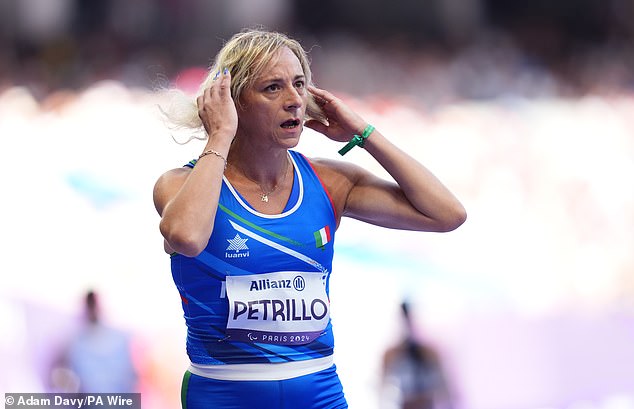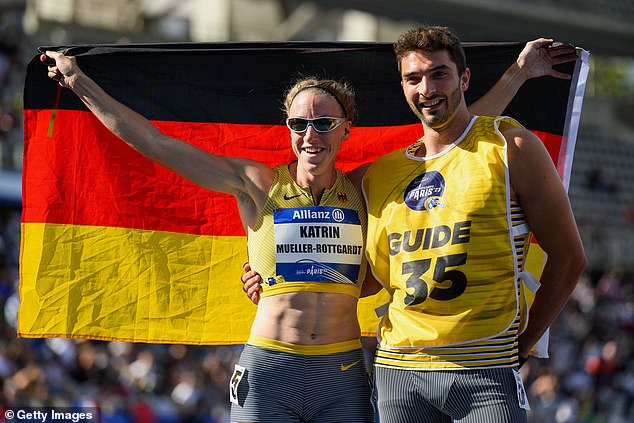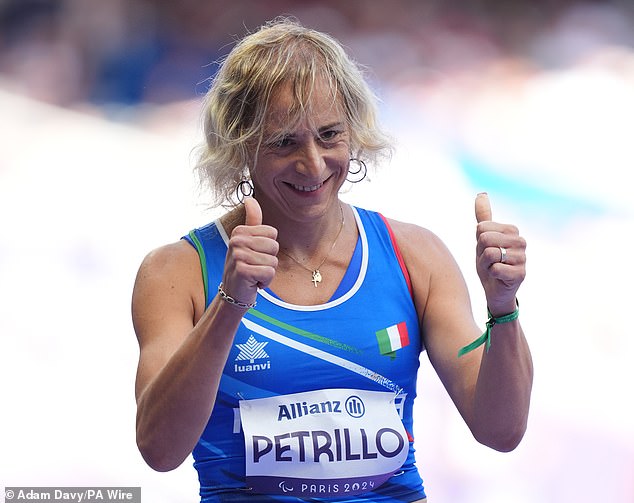- The first transgender athlete in Paralympic history competed on Monday
- Valentina Petrillo, 51, qualified for the semi-finals of the 400m in the women’s T12 category.
- There have been negative reactions to Petrillo’s participation in the Paralympic Games
An athlete who has won 11 men’s national titles qualified for the women’s 400m Paralympic semi-final at the age of 51 on Monday after the sport’s governing body accepted the athlete’s eligibility to compete.
Italian Valentina Petrillo, a father of two who at 45 still competed as a man and claimed her right to compete in the women’s category for “happiness”, came second in her heat, beating a Chinese runner 18 years her junior.
Although the World Para Athletics Association (WPA) insists that Petrillo’s post-transition testosterone levels make her fit to compete, the athlete had an added advantage over Venezuelan and Chinese competitors in her heat, because of the visually impaired competitors. While the other two runners needed a guide, Pertrillo ran unaided.
Female athletes have said the runner – the second known transgender athlete to compete at the Paralympics, after a Dutch woman in 2016 – has a clear advantage.
Petrillo ran her heat in 58.35 seconds. The Chinese runner behind her finished in 1:01.11.
Valentina Petrillo (pictured), the first transgender Paralympian in history, qualified for the semi-finals of the women’s 400m T12 on Monday

Petrillo finished second in her heat, which was enough to secure her passage to the next round.

Petrillo defeated five of his female rivals and will compete in the semifinals on Monday night.
The semi-final will be on Monday night and the final on Tuesday.
Petrillo has faced criticism for her participation in the Games, with one of her rivals expressing fears that the Italian “has an advantage” over the rest of the field ahead of Monday’s race.
German Paralympian Katrin Mueller-Rottgardt told Bild: “Basically, everyone should live their everyday life as they feel most comfortable. But I find it difficult in competitive sports.
‘She (Petrillo) has lived and trained as a man for a long time, so there is a possibility that her physical demands are different from those of someone who was born a woman. This could give her an advantage.’
Madrid lawyer Irene Aguiar also criticised Petrillo’s “unfair” participation after claiming that he took the place of a Spanish athlete.
In the qualifying rounds for the Paralympic Games, Petrillo reached the semi-finals ahead of blind Spanish sprinter Melani Berges, 33, who finished fifth and missed the chance to compete in Paris.
Aguiar, a specialist in international sports law, told Bild: “Our Spanish athlete Melani Berges has missed the chance to qualify for the Paralympic Games. The reason for this is the participation of Fabrizio ‘Valentina’ Petrillo, who has reached the final instead of her. That is unfair.”

Visually impaired German sprinter Katrin Mueller-Rottgardt, 42, fears that Petrillo, 51, “may have an advantage” because “she has lived and trained as a man for a long time.”

Spanish lawyer Irene Aguiar (pictured), who specialises in international sports law, says Petrillo’s participation is “unfair”
But Petrillo defended her participation in the Games, telling reporters before arriving in France: “I honestly can’t wait to be in Paris and compete on that beautiful purple track and in front of all that enthusiastic crowd. I think there will be a lot more love for me than I can imagine.
“It is only fair that each of us can express ourselves in our own gender. Sport should teach us the value of inclusion and this is fundamental for people’s happiness.”
Petrillo was cleared to race and looked in good form as he advanced to the semi-finals.
He is also scheduled to run the 200 metres later in the competition.

